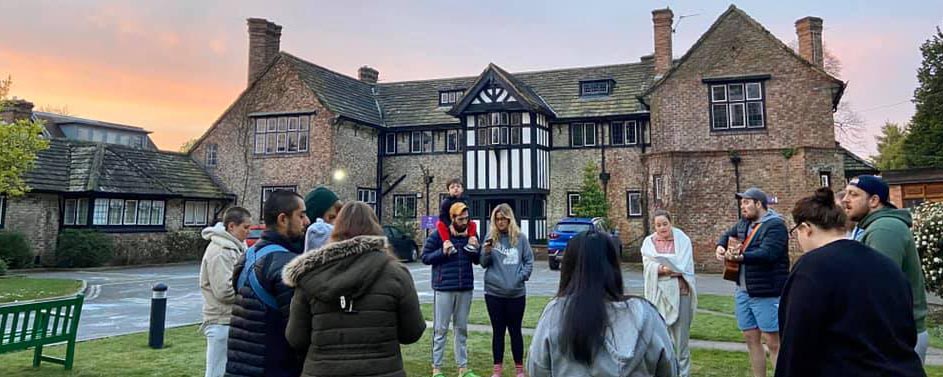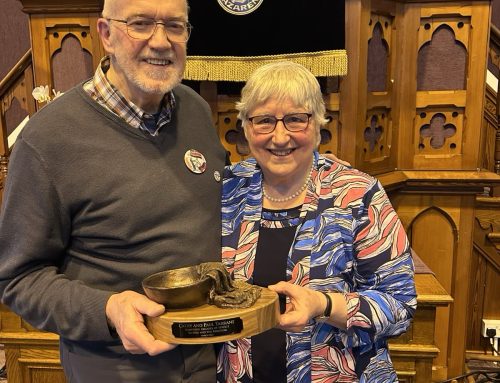There are four Nazarene colleges in the Eurasia Region, serving the higher education and leadership training needs of Nazarenes across dozens of countries. As the world adopts varying stay-at-home and social distancing measures to slow the spread of coronavirus, the Nazarene colleges are rapidly shifting to continue delivering high quality theological education to their students.
European Nazarene College (EuNC)
As a fully decentralized school, with administrators already working from home in a variety of nations, EuNC’s day-to-day business has not changed much under pandemic threat and widespread stay-at-home orders, according to a written statement from the EuNC leadership team.
Regarding the continuation of classes, “as a school, we did not create a ‘one-size-fits-all’ response since our students span five time zones and more than 17 countries,” they wrote.
Classes in nine nations were already taking courses fully online, so education delivery through spring term has not been disrupted.
Other learning centers combined intensive in-person sessions with video conferencing. Those centers shifted the classroom sessions entirely to video conference and other online tools.
EuNC was in the midst of a leadership transition as the pandemic erupted. On 3 January, longtime Rector Dr. Klaus Arnold accepted the role of director of Global Education and Clergy Development. In early April, Rev. Maria Gusztinne Tulipan, was announced as EuNC’s new rector, effective 1 May. Previously, Gusztinne Tulipan served as administrator of the EuNC learning center in Hungary, and as cluster chair on the EuNC Curriculum Committee in the area of ministerial skills.
“Though our course delivery has, for the most part, continued as normal, our students’ lives have all been disrupted, not only by COVID-19, but in some cases even by other disasters like a major earthquake,” the leadership team wrote. “Instructors, therefore, are all taking this into account as they go through the coursework, as adjustments may need to be made on some deadlines due to the situation within each country. Our learning center coordinators are working with students on any financial issues. Prayer is appreciated during these difficult days for our students, instructors and administration.”
Nazarene Theological College (NTC)
Nazarene Theological College was founded near Glasgow, Scotland, with a handful of students in 1944, in the midst of World War II’s blackouts, blitz and rationing. The college has gone through uncertain chapters throughout its history, including a short period that it was “homeless,” meeting at a local Nazarene church in Manchester. Yet, Dr. Peter Rae, vice principal and academic dean, said the challenge to deliver education during a pandemic is a first for the institution.
The college, based in Manchester, England, swiftly adapted to the government’s requirements for faculty, staff and students to study and work from home. Thankfully, the school had already been developing and expanding its online delivery when it was “pressed into” full delivery a few weeks ago, Rae said.
“There were two things we had already done: Flexible learning in our undergrad program, that used ZOOM to support students who were unable to physically attend classes on the College campus,” he said. “Second, the approval of some selected postgrad classes that we thought would work well by video conference. So we were able to move forward much more quickly [in response to stay-at-home] orders.”
Rae said that the rapid pivot to full online delivery has been surprisingly smooth and effective. And, class attendance has been even better since students’ classes shifted to fully online in the pandemic.
NTC has its sister college to thank, in part, for its ability to offer all its courses through videoconference.
About a year ago, NTC wasn’t satisfied with the video conference platform it had been using to connect with its licensed ministers and to occasionally bring in a remote student to a class that was meeting on campus. And the college wanted to do more online delivery. Its sister school in Brisbane, Australia (Nazarene Theological College Australia-New Zealand), offered NTC use of its suite of Zoom rooms. Because the two schools are separated by 12 time zones, the classes at each school would not overlap on the schedule. The experiment of sharing Zoom has become a long-term partnership that positioned NTC to swiftly adapt to the pandemic.
Three PhD candidates successfully defended their theses over video conference in March. One of the candidates was based in Nairobi, Kenya, where he where he teaches at Africa Nazarene University, while his examiner was based in the UK.
“We have this global image of the church at work, it’s lovely,” Rae said.
The college’s beloved tradition of a campus-wide, daily coffee break moved to Facebook, with people sending in pictures of where they were pausing for coffee and tea at 10:45 a.m. An open day, in which prospective students and residents are invited to tour the campus, meet with faculty and students, attend chapel and a class, was retooled to be held online. Weekly chapel services are continued each Tuesday by livestream. And small groups for prayer and support continue to meet online, and have been a key means of supporting students through challenging times.
The College’s three-week PhD residential period has also gone online: the key research papers and seminars will continue, but this year the cut-and-thrust of presentation and discussion will happen by videoconference (and students will have to supply their own coffee!).
Already thinking long-term, Rae said the college will likely continue the wider availability of remote learning even when the pandemic, and its corresponding stay-at-home requirements, has largely ended.
“We wouldn’t want to see the embodied learning disappear, that’s really valuable to us,” he said. “But this has shown us there is community in other platforms, although it’s easier when you already have community. One of the reasons our pastoral care groups work so well in Zoom is because those relationships have been formed on the ground and in the flesh with people you know. But it does make us see this can work in this way. It has been very helpful.”
Faculty and staff have been working from home, and meet virtually through video conference. Rae said it has been hard for him not to be able to physically see his colleagues each day, although they have video meetings and chat through a WhatsApp group.
“We miss the chance to be together and work together.”
South Asia Nazarene Bible College (SANBC)
“We have suspended all classes face to face until end of June, however most students are asked to revise their readings and assignments at home,” wrote Principal Rev. Simon Jothi. “In few of our learning centers, classes in WhatsApp and Zoom are going on, especially in less affected places.”
SANBC provides theological education to hundreds of students in Pakistan, Bangladesh, Sri Lanka, Nepal and India.
The graduation ceremony planned for October in Nepal has been postponed, as is the Summer School of Wesleyan Students scheduled for April and May, and several other events.
Additionally, the opening of two new learning centers in India, with an expected 56 students, has been postponed.
Normally, enrollment for June is opened from January through March. With the beginning of the pandemic in February and March, enrollment has been affected, as well.
“The positive side of the lockdown of COVID-19 is that students’ and teachers’ reading habit is increased, and as a school, we sense the need to do online course offerings in the coming days to deal with situation like this,” Jothi said. “Second, we have initiated humanitarian services to the most vulnerable people in each of our communities where it is needed.”
Arabic Nazarene Bible College (ANBC)
Prior to the pandemic, ANBC had been discussing the development of fully online course delivery. It serves students in several Middle Eastern nations and areas, including Jordan and Lebanon. However, there are Arabic-speaking Nazarenes and Nazarene churches in Australia, Canada, Poland and other parts of the world who could benefit from learning Wesleyan-Holiness theology in their native Arabic tongue.
The pandemic thrust the college into this new territory nearly overnight.
One student who has been flying from Poland to Lebanon for monthly courses can now study online at home.
“God is using the crisis of corona to fulfill our dream at ANBC to teach Arabic-speaking students who are scattered around the world,” said Haidar Halassa, principal.
To find out how to study at ANBC, write to office@eurasiaregion.org.





